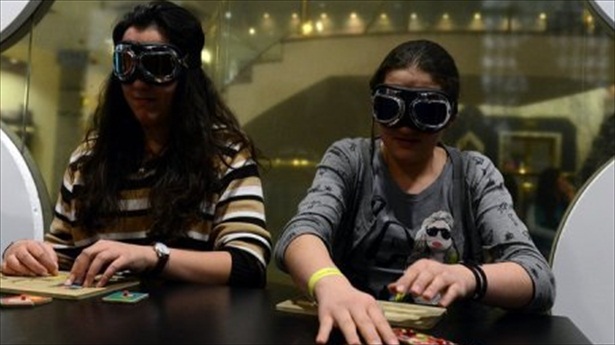
The darkness is total. Mundane gestures suddenly become complicated. How do you find the door to your room, cook a meal or cross the road?
The “Invisible Exhibition” in the Polish capital Warsaw offers an opportunity to understand what it is like to be sightless, as blind guides steer visitors round in blacked-out rooms .
“The visitors take on the role of the blind,” exhibition curator Malgorzara Szumowska told AFP.
“Thanks to a series of sense-based installations, you experience what it is to live in the dark.”
The hour-long tour requires a healthy imagination, as the sighted learn how smell, hearing, taste and touch work differently in this unknown world.
“There are six rooms, all in utter darkness. Each one replicates a scene from daily life: an apartment, a street, a museum, and so on,” said Szumowska.
The noise seems overwhelming in the street scene, where visitors must dodge cars and lampposts. Smells are a delight in a forest chalet, as is the sound of a stream under a small wooden bridge.
The last stop is a loud cafe where the blind guide takes on the role of the barman.
Along with the dark side, the exhibition has a section with light that offers educational games to stimulate the senses and demonstrates tools the blind use in their daily lives, such as braille.
“Our goal is to show that the invisible world is beautiful and sumptuous, and that the blind have a sense of humour, with a life and passions,” said Szumowska. “Fate doesn’t exclude them from society.”
— “At first I was terrified” —
The idea for the exhibition came from Hungary, where a woman blacked out her apartment to understand and share the experience of her husband, blinded by an accident.
Her experiment led to an exhibition-cum-social project in the capital Budapest. It caught on, and was followed by a version in the Czech capital Prague then another one in Warsaw, which opened a year ago.
Some 30,000 people have visited “Niewidzialna Wystawa”, as it’s called in Polish.
“It’s very powerful,” said Warsaw student Aleksandra. “At first I was terrified. I didn’t know what was going on around me. I felt lost. But luckily there was a blind guide.”
The guides are paid, a boost in a labour market where options for the blind are often limited.
“It’s the best job I’ve ever had,” said Pawel Kozlowski, one of the team.
It’s also a challenge, said 31-year-old Pawel Orabczuk, a graduate in teaching and social work as well as a sound engineer and drummer in a heavy metal band who has been blind since birth.
“The main thing for we guides is to ensure that everything feels fine and safe,” he said. You not only have to help visitors tap their four remaining senses but you must do so “only through words, because they can’t see your gestures in the dark.”
“If only one visitor in 10 realises that you should consider the blind as an ordinary person, that’s a success,” he added.
Even “we can still say, ‘See you soon’,” he said at the exit. “How else can you put it?”
